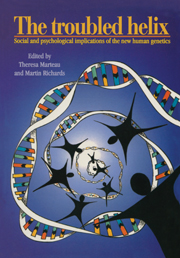Book contents
- Frontmatter
- Contents
- List of contributors
- Preface
- Preface to the paperback edition
- Acknowledgements
- Part I Personal stories
- Part II Clinical context
- 2 The new genetics: a user's guide
- 3 Decision-making in the context of genetic risk
- 4 Genetic counselling: some issues of theory and practice
- 5 Evaluating carrier testing: objectives and outcomes
- 6 Psychosocial aspects of prenatal screening and diagnosis
- 7 The genetic testing of children: a clinical perspective
- 8 Predictive genetic testing in children: paternalism or empiricism?
- Part III Social context
- Index
8 - Predictive genetic testing in children: paternalism or empiricism?
from Part II - Clinical context
Published online by Cambridge University Press: 01 June 2011
- Frontmatter
- Contents
- List of contributors
- Preface
- Preface to the paperback edition
- Acknowledgements
- Part I Personal stories
- Part II Clinical context
- 2 The new genetics: a user's guide
- 3 Decision-making in the context of genetic risk
- 4 Genetic counselling: some issues of theory and practice
- 5 Evaluating carrier testing: objectives and outcomes
- 6 Psychosocial aspects of prenatal screening and diagnosis
- 7 The genetic testing of children: a clinical perspective
- 8 Predictive genetic testing in children: paternalism or empiricism?
- Part III Social context
- Index
Summary
There is always a problem when new medical technologies lead to clinical services for which we have no or little evidence of their impact. The desirable approach is to carry out clinical trials to determine their effectiveness and safety. Predictive genetic testing is a technological development with possible psychological and social effects that have been much discussed. Because predictive testing can be offered to children, as well as to adults, the discussion has been wide-ranging, encompassing issues such as competence to give informed consent, the rights of the child and autonomy.
The complexity of these issues does not mean that policies should be formulated without the backing of relevant research. Indeed, it could be argued that such testing should only be offered as part of a research protocol determining its effects and the circumstances under which it is most effective and least harmful.
There are three general approaches to the clinical introduction of genetic developments that can be identified in past practice. One is to herald caution, and keep the debate within professional circles. The second is to consult widely, seeking the opinions of potential users of new services and the general public. The third is to promote rapidly the research that will address the questions of psychological and social impact. In Chapter 7, Clarke and Flinter emphasise the first approach; I shall discuss the second two approaches.
The current view of clinical geneticists is summarised by Clarke and Flinter as follows:
Discussion among clinicians and scientists involved in developing a molecular genetic predictive test for [Huntington's disease] led to a consensus view that children should not be tested.… […]
- Type
- Chapter
- Information
- The Troubled HelixSocial and Psychological Implications of the New Human Genetics, pp. 177 - 184Publisher: Cambridge University PressPrint publication year: 1996
- 25
- Cited by



